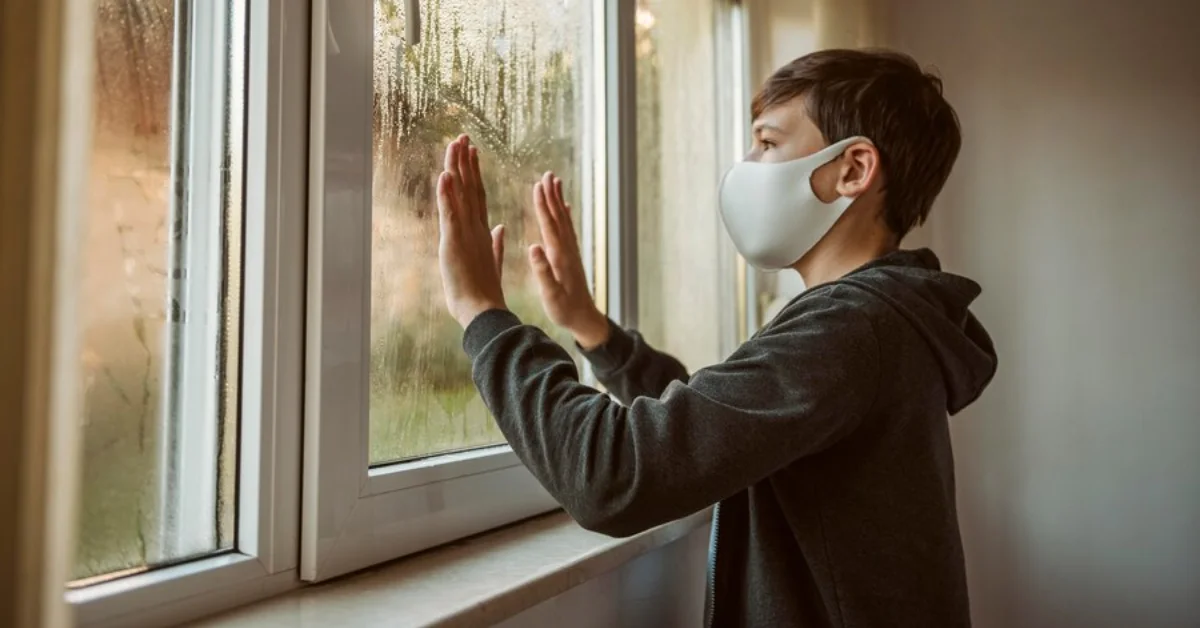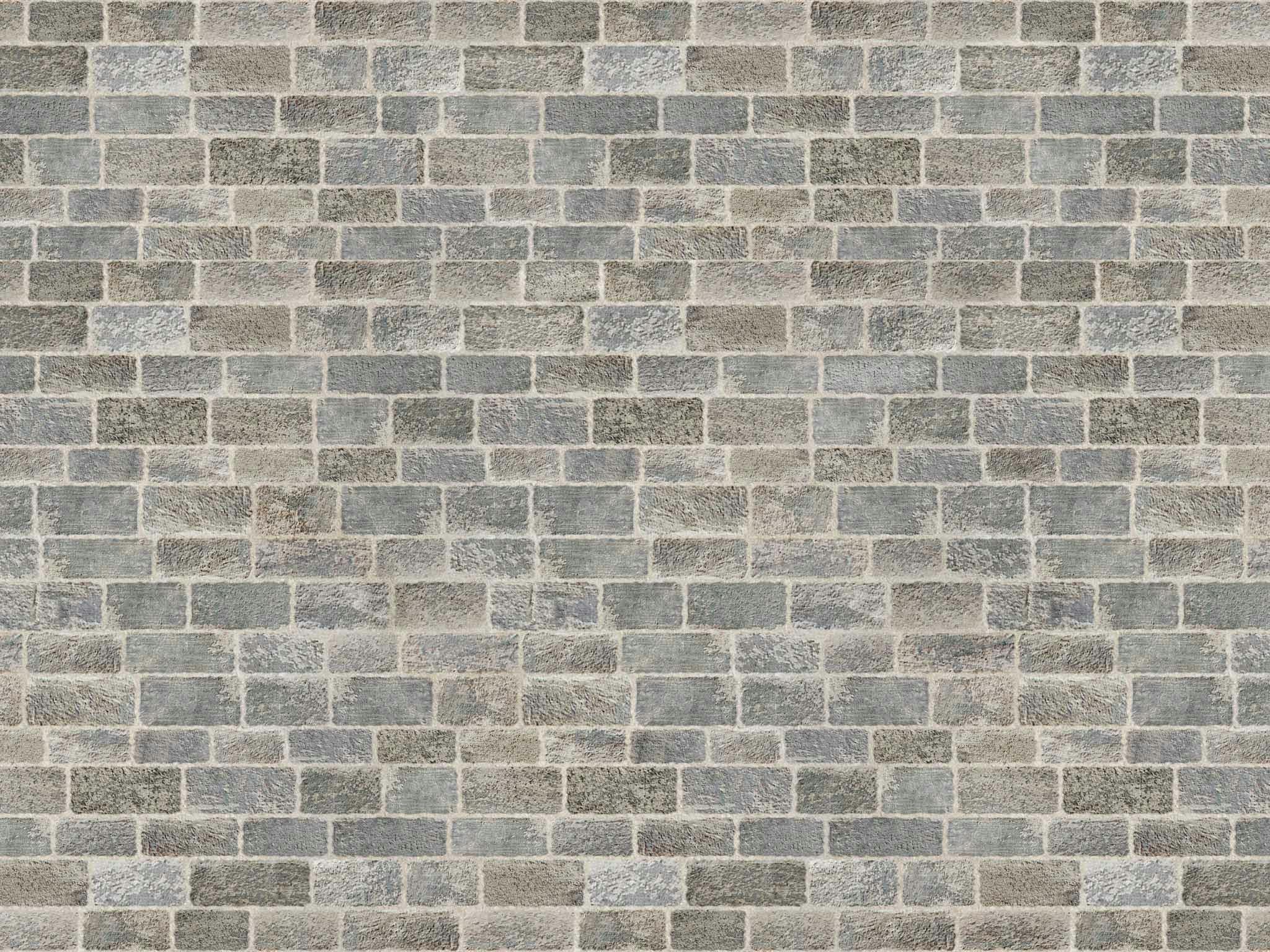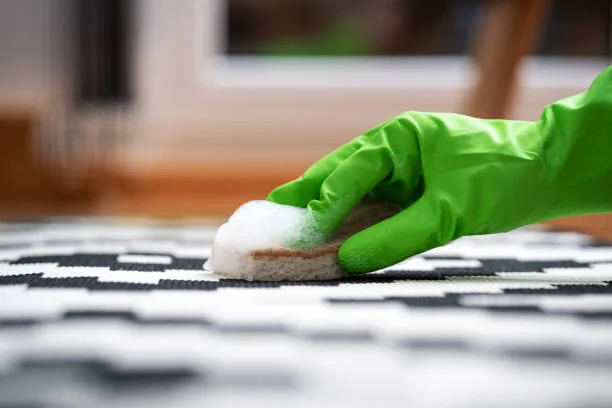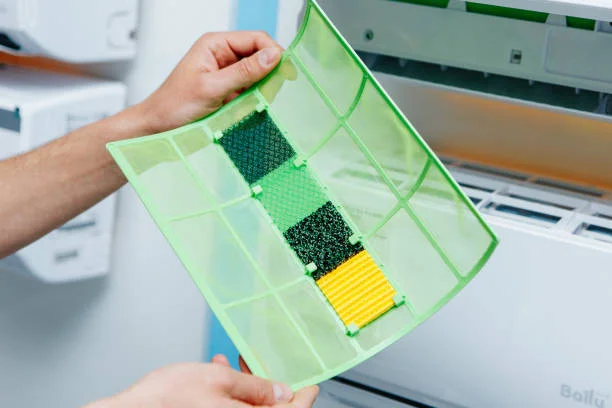HOME IMPROVEMENT
Why Mold Remediation Is Essential for Home Health

What Is Mold and How Does It Affect Your Home?
Mold is a fungus that can thrive indoors when conditions are just right. Areas with high moisture, such as bathrooms and basements, are especially susceptible. Mold isn’t just an eyesore; it can also lead to various problems. It can eat away at building materials, cause structural damage, and diminish the air quality inside your home. Mold spores are always present in the air but become problematic when they settle on damp surfaces and begin to grow. That’s why mold removal is crucial for maintaining your home’s integrity and your family’s health.
Key Takeaways:
- Mold can pose serious health risks and should be dealt with promptly and effectively.
- Professional mold remediation services ensure complete removal and prevention of future growth.
- Regular home maintenance and awareness can prevent mold issues from arising.
ALSO READ: When to Replace Forklift Tires: A Comprehensive Guide
Health Risks Associated with Mold Exposure
Mold exposure can have various health effects, particularly in those with preexisting respiratory issues. According to research, symptoms like sneezing, coughing, and skin irritation can occur, and prolonged exposure may result in more severe respiratory problems or infections. Mold exposure is particularly hazardous for sensitive groups, including the elderly, children, and those with chronic respiratory conditions. With these potential health risks in mind, effective remediation becomes not just an issue of comfort but safety and wellbeing.
How to Spot Mold in Your Living Space
Mold can be elusive, often lurking out of sight. The obvious signs include visible patches of discoloration on walls, ceilings, and even furniture. A pervasive musty odor is another indicator of hidden mold. Regular home inspections are crucial to catch mold early. If you notice wallpaper peeling away or unexplained dampness, these are strong indicators that you may have household mold. You don’t need to be an expert to perform basic checks, and numerous DIY mold detection kits are available to help identify mold growth in less apparent areas.
Steps to Prevent Mold Growth
The key to preventing mold is managing moisture levels. This entails employing exhaust fans in high-humidity areas like bathrooms and kitchens, making sure there is adequate ventilation, and fixing leaks as soon as they occur. Dehumidifiers can also be invaluable tools for keeping indoor humidity at bay. Routine inspections of plumbing, roofs, and windows help identify potential leaks before they become significant problems. Incorporating these preventive measures can save homeowners from the more substantial and costly issues that unchecked mold can cause.
Why Professional Mold Remediation Works Best
While tackling a mold problem yourself might seem like a cost-effective option, professional services offer comprehensive solutions that ensure mold is entirely removed and doesn’t return. Professionals utilize advanced techniques and tools to address all stages of a mold growth cycle, stopping the problem at its source. The remediation process often involves a thorough assessment, containment strategies, air filtration, and cleaning of mold-infested areas. The expertise provided by professionals not only resolves current issues but also implements preventative measures.
Natural Remedies for Minor Mold Issues
Natural solutions can be effective for smaller, isolated mold growths. Vinegar, baking soda, and tea tree oil have antifungal properties, making them suitable for handling minor infestations. These substances are preferred for their safety and environmental friendliness. However, it’s important to note that while these remedies are useful, they are not substitutes for professional intervention in cases of widespread or recurring mold, as only a comprehensive treatment can assure complete eradication.
When to Call in the Experts
Deciding whether to tackle mold independently or call in experts can take time and effort. If the mold is more than ten square feet in size or if the contamination returns after cleaning, the EPA advises seeking professional advice. Professional help is also recommended if there are health concerns related to mold exposure. In these situations, experts address the visible outbreak and identify and rectify underlying causes to ensure a lasting solution.
HOME IMPROVEMENT
How to Style Gray Wallpaper in an Interior: What to Pair It With

Gray can feel calm, modern, and very flexible. It can also feel cold if you choose the wrong оттенок or forget about lighting. That is why it helps to start with a clear idea of the mood you want. If you plan to refresh a room with minimal mess, gray removable wallpaper can be a practical way to test the color and see how it works with your furniture.
Why Gray Works in So Many Homes
Gray sits between warm and cool tones. That makes it easy to combine with other colors. It can act like a quiet background for art and decor, or it can be the main color in a clean, minimalist room.
Gray also comes in many looks. Some shades feel warm and мягкий, like greige. Others feel crisp and cool, with a hint of blue. You can also find gray wallpaper with texture, like linen effects, concrete looks, or subtle patterns. Texture matters because it adds depth and keeps gray from feeling flat.
Choose the Right Shade: Warm vs Cool
Before you think about furniture, decide if you want warm gray or cool gray. This choice affects the whole room.
Warm grays (often called greige) work well with beige, cream, and warm woods. They feel cozy and relaxed. Cool grays work well with white, black, chrome, and cooler blues. They feel sharper and more modern.
Lighting can change gray a lot. A shade that looks neutral in daylight may look blue or green under warm bulbs. That is why samples help. Check them in the morning, afternoon, and evening.
Best Color Pairings for Gray Wallpaper
Gray plays well with both soft neutrals and richer accents. The pairing you choose depends on the room and the mood.
Here are combinations that work in many interiors:
- Gray + warm white for a clean, calm base
- Gray + natural wood for warmth and balance
- Gray + black accents for a modern, graphic look
- Gray + muted green for a natural, relaxed feel
- Gray + dusty blue for a quiet, airy mood
- Gray + blush or terracotta for soft warmth and personality
If you want a спокойный interior, keep accents muted. If you want more drama, add darker tones and stronger contrast.
Materials That Make Gray Look Better
Color is only half of the story. Materials decide whether gray feels cozy or cold. Gray wallpaper often looks best when you mix in warm textures.
A few materials that pair well with gray:
- wood in warm tones (oak, walnut)
- textiles like linen, wool, cotton, and boucle
- matte metals, such as black steel or brushed brass
- ceramics and stone for a natural, grounded feel
If the wallpaper has a smooth, concrete-like look, balance it with softer fabrics. If the wallpaper has a woven texture, keep furniture lines cleaner.
Room-by-Room Ideas
Living room
Gray wallpaper can make a living room feel elegant and calm. Use it behind the sofa or on a TV wall. Add a warm rug and layered lighting. Choose pillows in warm neutrals or muted colors.
Bedroom
Gray works well in bedrooms because it supports rest. Pair it with soft bedding, warm lamps, and natural textiles. If you want a hotel feel, add one darker accent, like charcoal cushions or a black frame.
Kitchen and dining area
Gray can look modern in kitchens, especially with white cabinets and wood details. In dining spaces, gray wallpaper can make art and table settings stand out. Keep the room bright with good lighting.
Home office
Gray makes a clean background for work. It looks professional on video calls. Add one warm element, like a wood desk or a soft rug, to avoid a холодный mood.
Pattern and Texture: How to Keep It Interesting
Plain gray can look great, but it can also feel flat in a large room. Subtle pattern or texture helps. Think тонкая геометрия, light stripes, or linen-like texture. These details add depth without turning the wall into a distraction.
If you choose a patterned gray wallpaper, keep other prints limited. Use solid curtains and simple rugs. Let the wall carry the visual detail.
Simple Styling Rules That Work
Gray becomes easy when you follow a few basic rules. They keep the room balanced and comfortable.
- Use warm lighting, especially in the evening.
- Add at least one warm material, like wood or a textured rug.
- Repeat your accent color in two or three small places.
- Keep contrast intentional: either soft and calm, or bold and graphic.
- Test samples in your real room lighting before committing.
Gray wallpaper can look timeless when you choose the right shade and add warmth through texture. Pair it with natural materials, soft textiles, and thoughtful lighting, and it will feel calm, modern, and easy to live with.
HOME IMPROVEMENT
How Eco-Friendly Carpet Care Protects the Environment

Carpets naturally trap dust, allergens, and everyday grime eco-friendly carpet care, which means regular cleaning is essential.
The problem lies in traditional cleaning methods. These products can release toxins into the air, contaminate waterways, and linger in your home long after cleaning is done.
Eco-friendly carpet care offers a more thoughtful approach. It delivers effective cleaning while reducing environmental harm. This, in turn, improves air quality and creates a safer living space for your family.
Use Eco-Friendly Cleaning Products
Choosing environmentally friendly carpet cleaning products is one of the simplest ways to reduce your household’s environmental impact.
These products are designed to break down naturally, without leaving behind harmful residues that pollute waterways or compromise indoor air quality.
For those who prefer a DIY approach, everyday kitchen staples such as white vinegar and sodium bicarbonate offer surprisingly effective cleaning power.
These natural ingredients tackle odours and light stains while remaining gentle on carpet fibres, helping preserve their texture and appearance over time.
Avoiding chemical-heavy cleaners can make a noticeable difference inside the home. Fewer airborne irritants mean cleaner air. This is especially important for children, pets, and anyone sensitive to allergens.
When buying ready-made products, it is worth checking labels for safety assurance and eco-certification that confirm responsible formulation and packaging.
By opting for products free from harsh chemicals, you are not just cleaning your carpets. You are actively supporting sustainable practices that protect ecosystems and reduce pollution.
Set Up a Regular Maintenance Routine
Sustainable carpet care is as much about consistency as it is about product choice. Simple, regular maintenance keeps carpets looking fresh. At the same time, it reduces the need for aggressive cleaning methods later on.
Frequent vacuuming removes surface dirt, dust, and allergens before they settle deep into the fibres.
Using a vacuum cleaner fitted with a HEPA filter takes this a step further by capturing fine particles that would otherwise circulate in the air. It’s one of the best ways to get a cleaner and healthier indoor environment.
Prompt attention to spills is equally important. Treating stains as soon as they occur prevents them from setting, which in turn reduces reliance on strong chemical treatments.
Even small habits, such as removing shoes indoors or placing mats at entry points, help limit the amount of dirt tracked onto carpets.
Occasional deeper cleaning using natural or low-impact products completes the routine. This approach not only maintains the carpet’s appearance but also extends its lifespan.
If you want to save resources and replacement costs, consistent upkeep is non-negotiable. With regular care, carpets remain vibrant and functional. Plus, they’ll stay with you for many more years.
Opt for Professional Eco-Friendly Cleaning Services
When carpets need more than routine care, a professional carpet cleaning business offers an effective and responsible solution.
These providers use advanced techniques that prioritise reduced water usage, lower energy consumption, and minimal chemical output, without compromising on results.
Selecting a reputable service starts with looking for clear evidence of environmentally responsible practices. Certifications, eco-labels, and transparent descriptions of their cleaning methods are strong indicators of a company’s commitment to sustainability.
Reviews and local recommendations can also help identify businesses that genuinely prioritise green standards. Once you have chosen a provider, open communication is key.
Ask about the products they use, their waste disposal methods, and how they minimise environmental impact during the cleaning process. Reputable services are usually happy to explain their approach and provide reassurance.
By choosing professionals who value sustainability, you support responsible industry practices while enjoying deeply cleaned carpets.
Choose Sustainable Carpet Materials
Sustainable carpet care begins long before the first clean. The materials you choose play a decisive role in how your flooring affects the environment over time.
Natural fibres such as wool stand out for their durability, renewability, and ability to biodegrade at the end of their lifespan. Wool carpets are resilient, naturally insulating, and capable of withstanding years of use without compromising comfort or appearance.
Sisal, derived from the agave plant, offers another strong option, combining impressive strength with a distinctly natural aesthetic suited to high-traffic areas.
Recycled materials are also gaining traction. Carpets and mats made from reclaimed plastic waste transform discarded materials into practical, long-lasting products, significantly reducing landfill pressure.
Reduce Water Usage
Water conservation sits at the heart of eco-friendly carpet care. Traditional cleaning methods often rely on excessive water, leading to unnecessary waste and longer drying times.
Low-moisture and dry-cleaning techniques offer a smarter alternative. These methods deliver effective results while using significantly less water, allowing carpets to dry faster and remain hygienic.
The reduced moisture levels not only protect carpet fibres but also help maintain a healthier indoor environment.
Modern eco-friendly cleaning machines are designed with efficiency in mind, so they’re worth considering. They optimise water usage without sacrificing performance, making them a practical choice for households committed to sustainability.
Dispose of Carpets Responsibly
The environmental impact of carpet care does not end when a carpet reaches the end of its life. Improper disposal contributes to landfill overflow and unnecessary waste, making responsible end-of-life decisions an essential part of eco-friendly living.
Recycling is one of the most effective options available. Many specialised facilities accept old carpets and break them down into materials that can be reused in new products. This applies to all of its parts, from the underlay to its fabric.
This process conserves raw materials and reduces the demand for new resources. Organisations such as Carpet Recycling UK play a key role in advancing these initiatives and encouraging more sustainable disposal practices across the industry.
Some carpet manufacturers also offer take-back or recycling schemes, allowing customers to return used carpets for responsible processing.
Choosing to buy from brands that support these programmes helps reinforce sustainable production cycles.
When a carpet is still in usable condition, donating it to charities or community organisations is another meaningful way to extend its lifespan and reduce waste.
Conclusion
Embracing eco-friendly carpet care is more than a trend—it’s a meaningful step toward a greener, healthier planet.
By choosing non-toxic cleaners, water-efficient methods, and sustainable products, you can dramatically lessen your ecological footprint without sacrificing cleanliness or comfort.
Every small change in how you maintain your carpets contributes to larger environmental wins in cleaner water, reduced pollution, and preserved natural resources. Protecting the environment and enjoying spotless carpets can go hand in hand.
HOME IMPROVEMENT
How Much Does a MagnaClean Filter Cost Installed?

A MagnaClean filter’s a must-have for keeping your heating system running smoothly. Think of it like a big magnet or MagnaClean filter that grabs all the gunk like sludge, rust, and stuff that can mess up your central heating.
By stopping all that junk from blocking things up, it helps your system run better and can cut down your energy bills a lot. Not only does it make everything work smoother, but it also helps your system last longer, which is great for saving money and staying worry-free in the long run.
Getting a MagnaClean filter’s a smart move if you want your heating to be in top shape and not cost you a fortune.
Factors Influencing MagnaClean Filter Installation Costs
When you’re thinking about putting a MagnaClean filter in your home, a few things can change how much it’ll cost. First off, the type of filter matters. Some have cool extras like stronger magnets or extra layers to clean better, which can bump up the price.
Then there’s how tricky the installation is. If your heating system’s tucked away in a tight spot like a crowded basement or an awkward attic, it’ll take more time and effort, which means more money.
Plus, where you live counts too. In cities, you’re likely to pay more for labor than in the countryside. Knowing all this can help you pick the best option for your needs and wallet.
Average Cost Range for MagnaClean Filters
MagnaClean filters come in different styles, each with its own perks and prices. The basic MagnaClean Professional 2 is usually between £80 and £100, and it’s great for getting rid of sludge and debris in most systems.
If you’re tight on space, check out the MagnaClean Micro 2, which goes for about £100 to £120. It’s small but still works like a charm for flats or smaller homes.
If you’re after top-notch performance, the MagnaClean TwinTech with its dual filters costs £120 to £150, perfect for bigger or more complex systems.
Prices might change depending on where you buy, so it’s a good idea to shop around for the best deal. Also, be aware that extra features like stronger magnets can bump up the price a bit. Have a look around and find what’s right for you!
Installation Costs and Considerations
Considering a MagnaClean filter? It’s handy to know that installation costs can vary quite a bit based on several factors.
The plumber’s expertise and your location play a big role. If your plumber has loads of experience, you might see a higher bill. Plus, living in a bustling city like London or Birmingham could mean steeper prices compared to a peaceful village.
Typically, you’re looking at labour costs ranging from £50 to £200.
Imagine you’re relaxing in a small-town flat; chances are, you’ll pay less. But if you’re in a large house in London with complex plumbing, expect it to be more expensive.
Here’s a friendly tip: gather a few quotes from different plumbers. This way, you can compare prices and get a sense of the services offered.
Hiringa qualified heating engineer is always recommended to ensure the filter is installed correctly and works efficiently right from the start.
You’ll find the best option for your budget and home needs. So, why not start collecting those quotes to ensure everything goes as planned without emptying your wallet?
Ways to Save on Installation Costs
Thinking about getting a MagnaClean filter installed? You can make it happen without breaking the bank if you know where to look for a deal.
Start by checking out local plumbers; they often run promotions, especially during quieter times like mid-week or off-peak seasons.
This could be your chance to snag a bargain. Before you dive in, gather a few quotes to compare prices and make sure you’re not sacrificing quality for cost. It’s wise to ask for a detailed quote, helping you avoid any surprise charges.
And don’t shy away from mentioning a lower price you’ve found elsewhere—some places might be willing to match it.
Keep an eye out for special offers that include extra services at a reduced rate. With these tips, you can save a bit of cash and keep your budget in check while getting your MagnaClean filter installed. Why not give it a try and see how much you can save?
Long-Term Savings Benefits
Installing a MagnaClean filter can be a game-changer for your energy bills because it boosts your heating system’s efficiency.
By capturing all the dirt and grime that typically clogs up your system, it allows everything to run smoother and use less energy. Some folks have actually seen their heating costs go down by a whopping 20-30% after installing one!
And since cleaner systems break down less often, you’re also saving on those dreaded repair bills. So instead of forking out hundreds of pounds on unexpected fixes, your system, with one of these nifty filters, keeps more money in your pocket over time.
But it’s not just about slashing energy use. A MagnaClean filter also helps extend the life of your heating system, meaning you won’t be shopping for a new one any time soon. Just be sure to give the filter a clean every six months to keep everything in top shape.
All in all, adding a MagnaClean filter isn’t just a quick fix; it’s a savvy investment for long-term savings. Why not consider giving it a shot and see the difference for yourself?
Regular Maintenance Checks
Keeping your MagnaClean filter clean is really important. It helps your heating system run smoothly, saving you from unexpected costs.
If you skip regular checks, you might face blockages, poor performance, and higher energy bills. Think of it like your car; ignoring maintenance can lead to bigger issues. Aim to clean the filter every six months to remove any gunk that the magnets might’ve missed.
Here are some cleaning tips:
- Mix a bucket of warm water with white vinegar. This combo tackles stubborn residues much better than water alone.
- Give the magnetic core a careful check since it catches most of the dirt. Even a small amount left behind can cause trouble down the road.
By regularly checking and cleaning your filter, you make sure your system works efficiently and avoid costly repairs. Setting a reminder or linking this task with your other chores, like changing smoke alarm batteries, can help you remember.
This simple upkeep keeps your heating system running smoothly, reduces energy costs, and helps prevent major issues before they start. Why not grab your cleaning supplies and give it a go?
Conclusion
Getting a MagnaClean filter is a smart move that might seem costly at first but saves you money in the long run. Prices can vary depending on the type of filter and how it’s installed, but the perks are obvious.
It cuts down your energy bills and reduces the need for repairs, saving you a good chunk over time. Check out local labour costs and get a few quotes to find the best deal for installation. Keeping up with regular maintenance will make sure your system works its best.
Take some time to think about what you need and your options so you can make the right choice. Why not start planning for your MagnaClean installation to enjoy a comfier and more efficient home?

 BUSINESS11 months ago
BUSINESS11 months agoBrand Visibility with Imprint Now and Custom Poly Mailers

 BUSINESS11 months ago
BUSINESS11 months agoExploring the Benefits of Commercial Printing

 TECHNOLOGY9 months ago
TECHNOLOGY9 months agoDizipal 608: The Tech Revolution Redefined

 HOME IMPROVEMENT11 months ago
HOME IMPROVEMENT11 months agoThe Do’s and Don’ts of Renting Rubbish Bins for Your Next Renovation

 HEALTH7 months ago
HEALTH7 months agoThe Surprising Benefits of Weight Loss Peptides You Need to Know

 HEALTH6 months ago
HEALTH6 months agoYour Guide to Shedding Pounds in the Digital Age

 HEALTH10 months ago
HEALTH10 months agoHappy Hippo Kratom Reviews: Read Before You Buy!

 HOME IMPROVEMENT7 months ago
HOME IMPROVEMENT7 months agoGet Your Grout to Gleam With These Easy-To-Follow Tips












